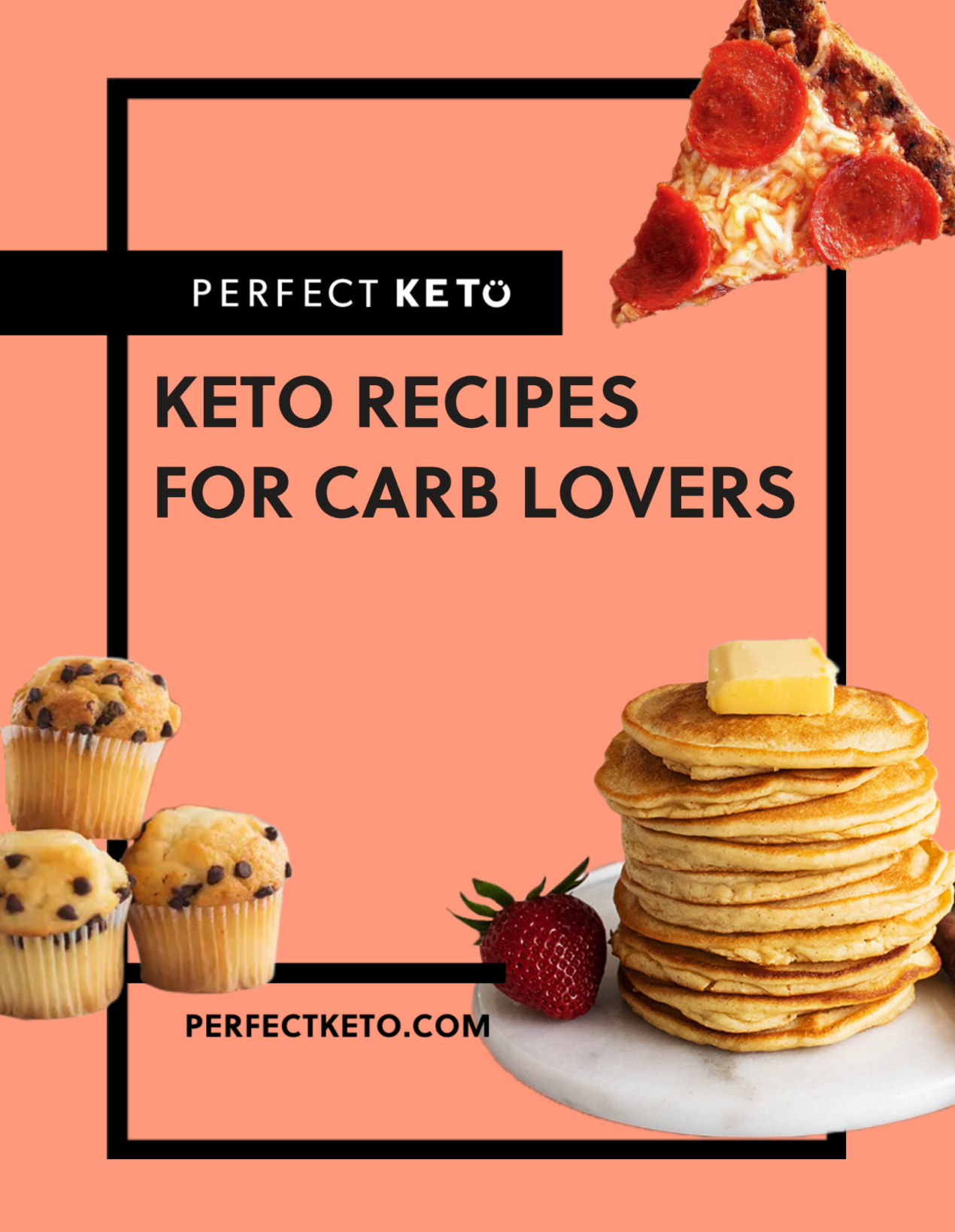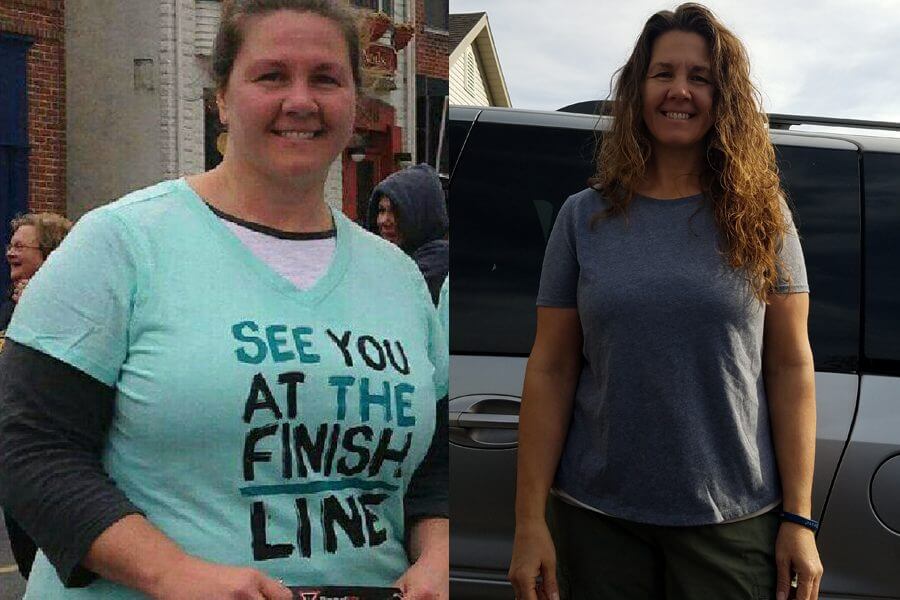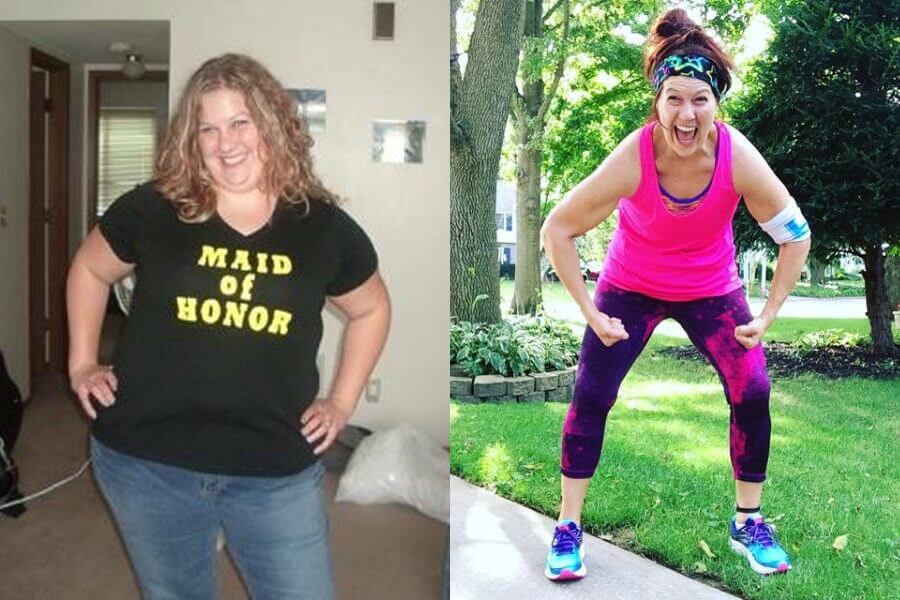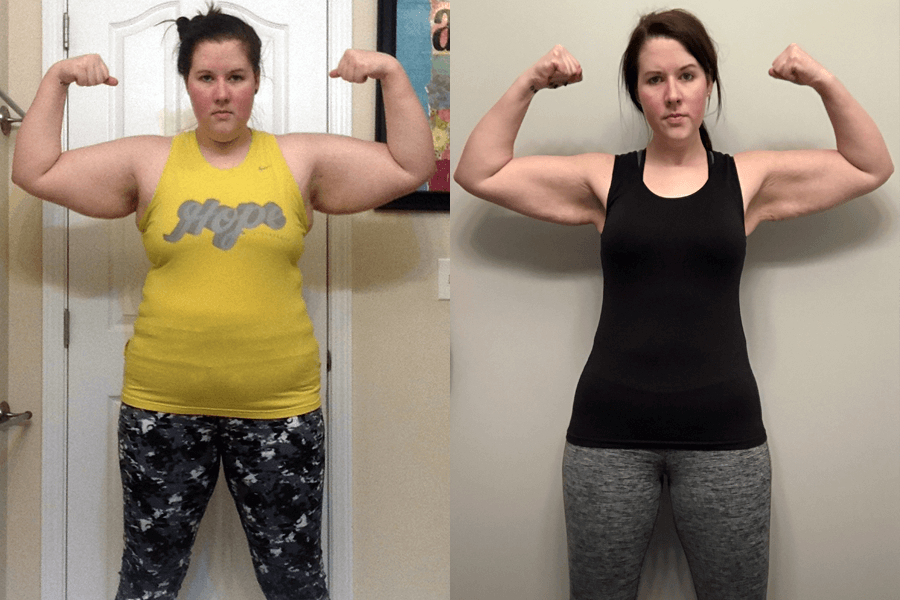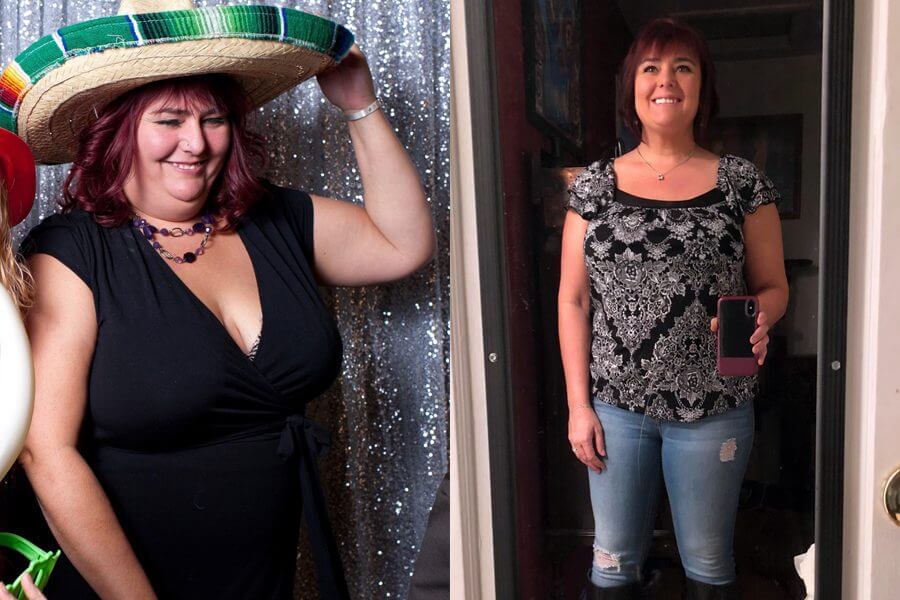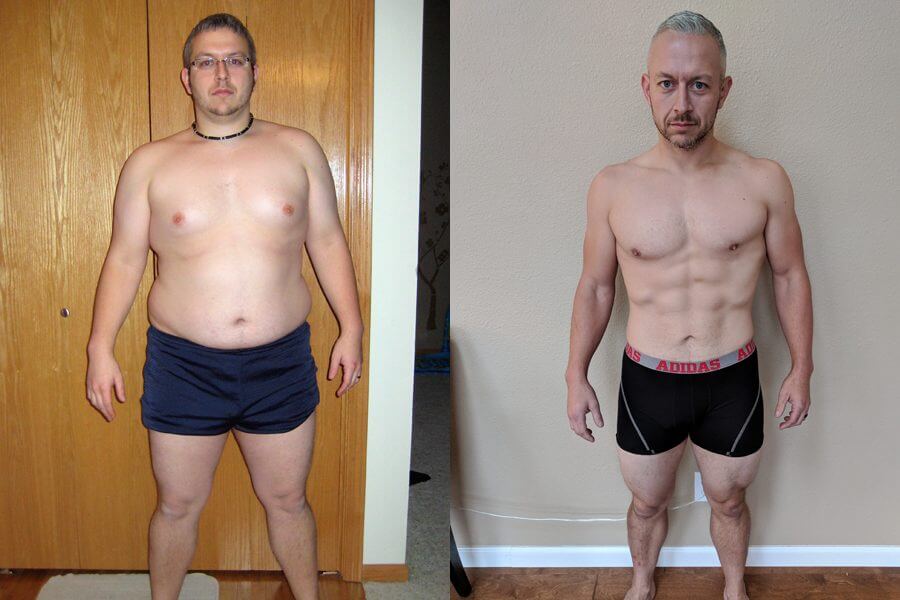- Anxiety
- Depression
- Bipolar
- Psychosis
- Autism
- ADHD
- Alzheimer's
- Eating disorders
- Summary
Eating a low-carbohydrate, whole-foods diet appears to be a powerful strategy for improving a number of health conditions.1
Could this same nutritional strategy benefit the brain as well? Emerging science and clinical experience suggest that the answer could be yes.2
Disclaimer: Low-carb nutrition and psychiatric diseases is a unique field without much research or experience. Therefore, although this guide passed our review for being labeled evidence-based, we acknowledge that much of the evidence is low quality or even anecdotal experience. In fields where there is sparse scientific research, we need to rely on clinical experience from experts in the field. We hope to be able to update this guide in the future as more research becomes available.
Many people think of mental health problems like depression, anxiety, and ADHD as chemical imbalances that require medication, but how often do we stop to wonder what causes these chemical imbalances? While medications are clearly helpful and important for some individuals, one could argue that the most powerful way to change brain chemistry is through food — because brain chemicals can be influenced by nutrients in the food we eat.3
This logical idea has given birth to the new and exciting field of nutritional psychiatry, dedicated to understanding how dietary choices affect our mood, thinking, and behavior. Emerging science and real-world experiences are revealing this empowering and hopeful new message: feeding your brain properly has the potential to prevent and reverse symptoms of mental health disorders, and in some cases help people reduce or even eliminate the need for psychiatric medications.
The steep rise in mental health problems around the world in recent decades closely parallels the pattern of many other so-called "diseases of civilization" associated with the industrialization of the human diet.4 Although many public health messages blame animal protein and fat for our predicament, meat is not a risky new foreign substance; it is an ancient, nutritious whole food that has been available since time immemorial.5
While we can't know precisely how much meat prehistoric peoples around the world used to eat, we do know that no human being could have survived without animal foods. Plant foods lack certain nutrients essential to human life, most notably vitamin B12, and B12 supplements were not available prior to the 1950s.6
What best distinguishes today's so-called "Western" diet from every dietary pattern that has ever come before it is not the presence of meat but the abundance of refined carbohydrates like sugar and flour, along with refined seed oils (aka "vegetable oils") like soybean and sunflower oil. These two substances, which are found in most of the processed and prepared food on the market, are the true signature ingredients of modern diets.
Although the science isn't entirely settled, excessive refined carbohydrates and seed oils may potentially contribute to inflammation, oxidation, hormonal imbalance, and insulin resistance — all of which research suggests may be key drivers of many physical and mental health problems.7
To be clear, these are not the only forces at play, and poor dietary quality is not the only factor influencing our risk for psychiatric disorders. However, since there is evidence connecting food choices with disease-producing processes, improving dietary quality by emphasizing whole foods and avoiding refined carbohydrates and modern highly-processed ingredients, makes good sense. But what of the metabolic impact of our food choices?.
Academic interest in ketogenic diets for the management of psychiatric conditions has grown substantially in the past several years. This is because decades of scientific research have established that ketogenic diets can address many of the imbalances in brain biochemistry that are seen in neuropsychiatric conditions, including neuroinflammation, excessive oxidative stress, neurotransmitter imbalances, and sluggish brain metabolism.8
While the scientific study of ketogenic diets for the management of specific psychiatric disorders is in its infancy, emerging clinical and research experience support the idea that ketogenic diets could represent new, exciting, uniquely therapeutic treatment options for a wide variety of mental health concerns.
Low-carbohydrate diets and psychiatric disorders
Anxiety disorders
Anxiety disorders include generalized anxiety disorder (excessive worry), panic disorder, post-traumatic stress disorder, obsessive-compulsive disorder, and social phobia. While clinical studies of ketogenic diets in the treatment of anxiety disorders have yet to be conducted, recently published reviews have explored the potential for ketogenic diets to address some of the biochemical mechanisms underlying anxiety.9
In my clinical experience, anxiety reduction is one of the most common benefits of LCHF diets.
A 31-year-old Mexican-American Harvard post-doctoral student came to me requesting help with frequent panic attacks, irritability, constant food cravings, "emotional eating," and sleepiness occurring two hours after meals. She was very health-conscious and hoped to avoid medication. I told her that her symptoms were probably related to carbohydrate sensitivity and recommended a whole foods LCHF diet. She changed her diet from this:
- Breakfast: Toast with peanut butter or Nutella, coffee with skim milk
- Lunch: Salad with tuna or cheese and a piece of bread
- Dinner: Pasta with cheese
- Snacks: Bananas and yogurt
to this:
- Breakfast: Two eggs with butter and guacamole
- Lunch: Meat and non-starchy vegetable
- Dinner: Meat and non-starchy vegetable
- Snacks: Nuts and cheese
When asked how the new diet had affected her symptoms, she told me: "I don't know how I dealt with it because they all used to bother me A LOT, but I would say that the symptoms are 90% gone."10
Depression
Medicines which reduce inflammation and improve insulin resistance can effectively treat depression symptoms, suggesting that inflammation and insulin resistance may play an important role in the development or severity of depressive disorders.11
In 2017, a small controlled clinical trial found that people diagnosed with Major Depressive Disorder who switched from a very poor quality modern diet to a Mediterranean-style diet experienced, on average, more relief from depression symptoms than those who made no dietary changes. A second study of a similar diet supplemented with fish oil noted benefits as well.12
These studies demonstrate that dietary quality matters to mental health. But they can't tell us whether a Mediterranean diet is the best diet for the brain, only that it's better than the standard modern diet. While it is tempting to believe that these diets reduced depression symptoms because they are higher in foods like olive oil and nuts, they were also designed to be very low in refined carbohydrates and seed oils. Researchers are now beginning to consider how sugar consumption can contribute to the risk of depression including inflammation, oxidative stress, insulin resistance, imbalances in gut bacterial populations, and disruption of dopamine signaling in brain reward pathways.13 More studies are needed to explore how and why different diets may affect depression symptoms.
There are no published human trials yet on low-carbohydrate diets and depression, but there are numerous instances within my own practice of ketosis relieving significant chronic depression symptoms, including this one:14
A 46-year-old musician and entrepreneur with severe depression since age 11 whose symptoms included fatigue, brain fog, anxiety, and frequent suicidal thoughts, consulted with me because he continued to suffer from all of these symptoms and was unable to work despite taking lamotrigine for depression and trazodone for sleep. At the time of his first appointment, he was eating a standard modern diet high in sugar and processed foods. After transitioning to a ketogenic diet, he felt more confident, hopeful, energetic, creative, and productive. When in ketosis, he "flourishes"; his suicidal thoughts subside and he feels as though life is worth living. He is now working full-time and has begun gradually reducing the dosages of his medications. He describes ketosis as "a miraculous medication."
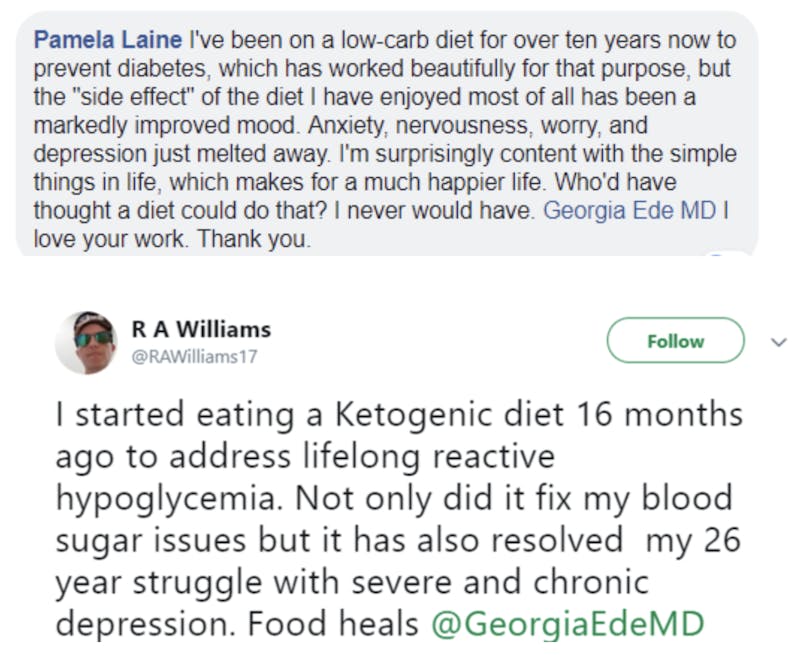
Bipolar disorders
Bipolar disorders used to be called "manic-depression." They come in many forms, including bipolar type 1, bipolar type 2, and some common milder forms that don't fit neatly into either category. All of these disorders are characterized by unstable mood patterns that include periods of increased intensity ("highs") such as mania, irritability, or severe anxiety, usually alternating with periods of depression. Interestingly, bipolar disorders and epilepsy have a lot in common, including similar neurotransmitter imbalances and electrolyte disturbances.15
In fact, since some of the same medications are used to treat both disorders, it's logical to wonder whether ketogenic diets, which have been used to treat epilepsy for nearly a century, could be helpful in managing bipolar disorder as well.
- A study of 121 people with bipolar mood disorders found that those who also have insulin resistance or type 2 diabetes face a harder road than those who don't. 16 Those with insulin resistance or type 2 diabetes were more likely to have chronic and rapidly-cycling mood symptoms and were less likely to respond to the mood-stabilizing medication lithium.
- In a published case study, two women with bipolar 2 disorder reported that a ketogenic diet was superior to the anticonvulsant/mood stabilizer lamotrigine (Lamictal) for managing their mood symptoms and that they were able to stop taking medication.17
- In an example from my own practice, a 26-year-old woman with bipolar 2 disorder who had struggled with bulimia and frequent migraines for many years adopted an LCHF diet and experienced complete resolution of binge-purge behaviors, migraines, and premenstrual distress.18 In addition, her "highs" shifted from angry to happy and her "lows" became less intense. We managed the leftover depression symptoms with a low dose of lamotrigine (a mood-stabilizing antidepressant medication) and psychotherapy.
Psychosis
Psychotic symptoms don't just occur in people with schizophrenia. They can also occur in many other psychiatric conditions, including depression, bipolar disorder, substance use disorders, and dementia.
Signs of psychosis include paranoia, auditory hallucinations (hearing voices), visual hallucinations (seeing things that aren't there), intrusive thoughts/images, and/or disorganized thinking. People diagnosed with schizophrenia are more likely to have glucose regulation problems and insulin resistance, even if they've never taken antipsychotic medications known to increase risk for these metabolic problems.19
We don't have enough information yet to know whether insulin resistance may play a causal role in schizophrenia, only that the two conditions often go hand in hand.
In animal studies, ketogenic diets have been shown to reverse some of the brain signaling abnormalities responsible for the development of certain psychotic symptoms such as hallucinations.20
A small but growing number of published case reports have documented that low-carbohydrate diets appear to dramatically improve symptoms of psychosis in some individuals, in two instances allowing for the complete discontinuation of antipsychotic medication and significant improvement in function.21
One of the most remarkable examples, first published by Dr. Eric Westman and Dr. Bryan Kraft in 2009, tells the story of a 70-year old woman who had suffered from auditory and visual hallucinations since age seven. Within only eight days of switching to a low-carbohydrate diet, her symptoms noticeably improved, and she eventually discontinued antipsychotic medication. Twelve years later, at age 83, she was still following a low-carbohydrate diet, had lost 150 pounds, and remained off of antipsychotic medication.
22
You can read more details about some of these cases in this article: "Ketogenic diets for psychiatric disorders: a new 2017 review."
Note that it's not possible to know how common these experiences of improvement are, or what exactly they are caused by.
Autistic spectrum disorder (ASD)
Three small clinical studies and two case reports have demonstrated that a ketogenic diet may be helpful for symptoms of autism spectrum conditions in some children.23
In a 6-month pilot study, 18/30 children (60%) with autistic behaviors were able to adhere to a ketogenic diet supplemented with MCT oil. All 18 of these children experienced some degree of benefit, with two children improving enough to advance to mainstream schools24
And in a 6-month randomized controlled trial of 45 children diagnosed with autism spectrum disorder, a modified Atkins diet outperformed a gluten-free/casein-free diet for the management of autistic symptoms.25
Attention deficit/hyperactivity disorder (ADHD)
While there are studies suggesting that simplified low-allergen diets consisting primarily of whole foods can be very helpful in children with ADHD, there are no studies yet that explore the relationship between refined carbohydrates and ADHD. Nor are there any that test low-carbohydrate diets on children or adults with ADHD.26
However, in my clinical experience, improved mental clarity is one of the most commonly reported benefits of low-carbohydrate diets, and I have seen cases of even severe ADHD that have responded to dietary intervention, such as this one:
Several years ago, I met with a 40-year-old woman who'd had lifelong symptoms of procrastination, lateness, poor motivation, low energy, distractibility, and disorganization that interfered significantly with her effectiveness at work and at home. I diagnosed her with ADHD, inattentive type, and she was started on Adderall (mixed amphetamine salts). Adderall greatly improved her symptoms but brought uneven benefits throughout the day and some annoying side effects. Over the past couple of years, she gradually improved the quality of her diet by removing grains, legumes, dairy, and most processed foods, which helped her mood and improved her physical health tremendously, but did nothing for the ADHD symptoms. When she decided to shift to a ketogenic diet several months ago, her symptoms began improving within just a few days. She has since stopped Adderall entirely and reports that she functions even better when in ketosis than on Adderall, without any side effects.27
Alzheimer's disease
Research exploring the connection between metabolism and most psychiatric disorders is in its infancy, but when it comes to Alzheimer's disease, we have multiple lines of evidence demonstrating that insulin resistance of the brain is not only a core feature of Alzheimer's disease but is likely to be a primary driving force in the development of this devastating illness. The relationship between insulin resistance and Alzheimer's is so strong that many scientists now refer to Alzheimer's as "type 3 diabetes."28
One of the ways insulin resistance contributes to poor brain function in Alzheimer's disease is by restricting insulin's entry into the brain.29
Since insulin is required for brain cells to use glucose effectively, low brain insulin may cause sluggish brain glucose processing and slowing of brain cell activity. This drop in brain power can begin decades before any cognitive symptoms become obvious and has been detected in women as young as 24 years old.30 So it's never too early to begin reducing your risk.
It's also almost never too late. A growing number of studies demonstrate that ketogenic diets and/or ketone supplements modestly improve thinking and memory in some people with "mild cognitive impairment" (pre-Alzheimer's) and early Alzheimer's disease.31 In the 2018 study described here, the LCHF diet plus MCT oil supplements (which raise blood ketone levels) improved cognitive test scores in people with mild Alzheimer's disease a little better than any existing Alzheimer's medication.32 This dietary strategy was safe, well-tolerated and manageable with the help of a caregiver.
Preliminary results from an ongoing Johns Hopkins University randomized controlled trial of a modified Atkins diet found that
those able to adhere to the diet scored significantly higher on memory testing after only six weeks compared to those assigned
to consume the diet recommended by the National Institute on Aging, which is essentially a low-fat Mediterranean-style diet. 33
And a 2020 systematic review of randomized controlled trials concluded that being in ketosis, either through a kethogenic diet, ketone supplements, or MCT supplements, "appears promising in improving both acute and long-term cognition among patients with AD/MCI (Alzheimer's Disease or mild cognitive impairment)." They also noted a greater beneficial effect in those without an ApoE4 gene.34
The most rigorous trial of ketogenic diets in Alzheimer's disease to date was published in February 2021 by researchers in New Zealand. 21 of 26 subjects diagnosed with mild Alzheimer's disease completed a 12-week randomized crossover trial of a modified ketogenic diet vs. a low-fat diet. Beta-hydroxybutyrate (blood ketone) levels averaged approximately 0.95 mM, which is much higher than previous studies have reported. While no significant improvement in cognitive testing was seen, a significant improvement on tests of daily function and quality of life was reported.35
These studies provide hope for people with memory issues related to Alzheimer's disease, but their findings tend to be quite modest, and most researchers note that adhering to a new way of eating can be particularly challenging for people with cognitive challenges.
In my clinical practice, I have found that, in addition to the full support and cooperation of household members and caregivers, frequent clinical contact to provide ongoing education, close monitoring of clinical progress, and guidance around dietary adjustments is key to helping people achieve and maintain the degree of nutritional ketosis necessary for noticeable benefits in mental clarity.

A ketogenic diet and Alzheimer's
GuideAlzheimer's disease and other related neurodegenerative conditions, which impact memory, behavior and decision-making, are now an epidemic hitting all Western societies. Can the ketogenic diet help with Alzheimer's prevention and treatment?
To learn more about how Alzheimer's develops and what you can do about it, watch this video:
6,870 views Add as favorite
Eating disorders
In my clinical practice, people with binge eating and bulimia who try a low-carbohydrate diet often experience relief from binge behaviors, because their cravings usually diminish significantly.36
Since binge eating triggers the impulse to purge, carbohydrate restriction can be a very helpful strategy for people with bulimia who are willing to change their diet. However, for some people, carbohydrate restriction is not sufficient to control cravings, as other foods can also trigger overeating in some individuals, with dairy, nuts, and sweeteners being the most common culprits.37 Identifying and eliminating trigger foods may be helpful in some cases.
Although no randomized clinical trials exist, a published case report of three adults with binge eating disorder and food addiction documents remarkable improvement in symptoms when carbohydrate intake was restricted to a maximum of 30 grams per day. This simple intervention brought binge episodes down from once or twice per day to essentially zero episodes per week, and these improvements were maintained even six months later. These outcomes mirror the clinical experience of many and are encouraging for future research efforts.38
However, if you have a history of undereating or have ever had anorexia, anorexic thought patterns, or are uncomfortable with eating fat, a low-carbohydrate diet may not be right for you. When you dramatically reduce carbohydrate, you must replace those calories with calories from healthy fats. If you can't increase your fat consumption substantially, a low-carbohydrate diet could be deadly, especially if you are already underweight or malnourished. If you are considering a low-carbohydrate diet, please seek medical and psychiatric consultation to discuss the risks and benefits as they pertain to your personal history and goals.
Summary
Although the food-mood link is still an emerging field of study, there is great potential for many to unlock better mental health by modifying our modern diets and giving up processed food.
For more on the role of sugar in mental health, and why you may feel better if you cut back on sugar and starch, please see our guide, How sugar may damage the brain.
But how do you begin a low-carb diet? And how might psychiatric medications be affected? Please see our guide about easing into a low-carb diet if you are taking medication for mental health issues.
And don't miss our FAQ: Answers to common questions about low-carbohydrate diets for mental health!
/ Dr. Georgia Ede, MD
More
Ketogenic diet for mental health: Come for the weight loss, stay for the mental health benefits?













